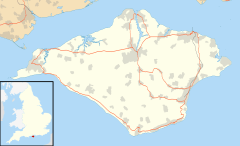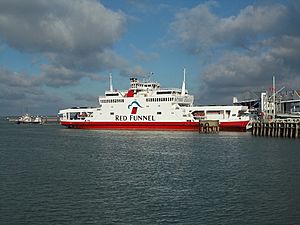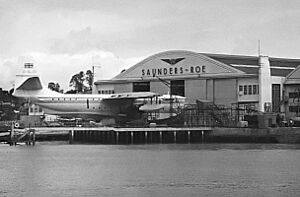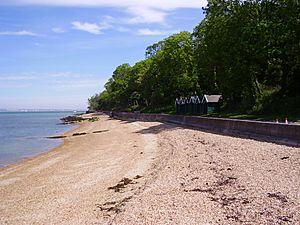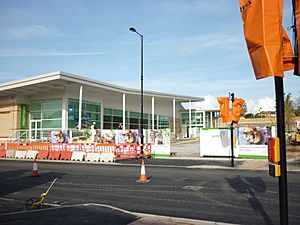East Cowes facts for kids
Quick facts for kids East Cowes |
|
|---|---|
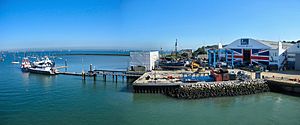 East Cowes seafront, showing the Columbine Yard building with its Union Flag doors. |
|
| Area | 5.0924 km2 (1.9662 sq mi) |
| Population | 8,428 (2021 Census) |
| • Density | 1,655/km2 (4,290/sq mi) |
| OS grid reference | SZ493958 |
| Civil parish |
|
| Unitary authority | |
| Ceremonial county | |
| Region | |
| Country | England |
| Sovereign state | United Kingdom |
| Post town | EAST COWES |
| Postcode district | PO32 |
| Police | Hampshire |
| Fire | Isle of Wight |
| Ambulance | Isle of Wight |
| EU Parliament | South East England |
| UK Parliament |
|
East Cowes is a lively town located on the north side of the Isle of Wight, an island off the south coast of England. It sits on the east bank of the River Medina, right across from its twin town, Cowes. About 8,428 people call East Cowes home, according to the 2021 Census.
These two towns are connected by a special boat called the Cowes Floating Bridge. It's a chain ferry, which means it pulls itself across the river using chains. The local council runs this unique ferry service.
East Cowes is also famous for two important places: Norris Castle and Osborne House. Osborne House was once the summer home of Queen Victoria and Prince Albert. Prince Albert even helped design some buildings nearby, like St Mildred's Church in Whippingham, which has cool turrets that look like a German castle!
Contents
What's the History of East Cowes?
The name East Cowes comes from an old word, Estcowe. This word referred to sandbanks on either side of the River Medina. People thought these sandbanks looked a bit like cows! Later, the name was given to forts built by King Henry VIII. These forts, called "cowforts," were meant to protect against French invasions.
Before it was called East Cowes, the area was known as Shamblord. The settlement here grew quite a lot, becoming more important than the area on the west bank. Because the Isle of Wight was often attacked by the French, a fort was built in East Cowes. This old fort is not the same as the "East Cowes Castle" built much later by John Nash.
How Did Queen Victoria Change East Cowes?
When Queen Victoria made Osborne House her summer home, she had big plans for East Cowes. She wanted to build a grand estate with fancy houses, gardens, and parks. This huge project didn't get enough money, so it wasn't fully built. However, a few of the early houses still stand today, like Kent House and Powys House on York Avenue.
What Castles Were Built Here?
Norris Castle was designed in the late 1700s by James Wyatt. It looks like a Norman-style castle and is still a private home today. In 1798, the famous architect John Nash built his own home here, called East Cowes Castle. This castle was known for its Gothic towers and fancy decorations. Nash often hosted important guests, including Prince Albert, at his home.
Sadly, East Cowes Castle was badly damaged by bombs during World War II. It was taken down in the 1960s. However, its old ice house still remains and can be seen on Sylvan Avenue.
How Did World War II Affect East Cowes?
During World War II, both Cowes and East Cowes were bombed often. This was because of their important industries and their closeness to big naval ports like Portsmouth and Southampton. The J. Samuel White shipyard in East Cowes was heavily damaged in May 1942. But when it was rebuilt, they started using new, clever ways to build ships. One of the first warships built there after the rebuilding was HMS Cavalier.
During one air raid, a Polish destroyer called Blyskawica helped defend the town. This ship, which was actually built by White's, fought so bravely that in 2002, people held a special event to remember the crew's courage.
What About the Giant Flag?
To celebrate Queen Elizabeth II's 25th year on the throne in 1977, something amazing happened. The main doors of the British Hovercraft Corporation factory were painted with the world's largest picture of the Union Jack (the UK flag). You can still see this giant flag today!
How Do People Travel in East Cowes?
East Cowes is connected to the mainland (the rest of England) by Red Funnel’s car ferry service. This ferry carries cars and people across the water.
As mentioned before, the Cowes Floating Bridge connects East Cowes with Cowes. It's a special chain ferry that runs all day. It's one of the few left that hasn't been replaced by a regular bridge.
Local buses, run by Southern Vectis, also help people get around. Route 4 goes to Ryde, and routes 5 and 25 connect East Cowes to Newport and other villages.
The Isle of Wight Coastal Path, a walking trail that goes all around the island, also passes through East Cowes.
What Industries Are in East Cowes?
For a long time, the main industry in both Cowes and East Cowes has been building and designing boats. This includes making early flying boats and sails.
East Cowes was also home to a famous aircraft company called Saunders Roe. They built huge, advanced flying boats like The Saunders-Roe Princess. They also worked on rockets, including the Black Knight rocket and the Black Arrow satellite carrier rocket. And guess what? They even developed and tested the very first hovercraft, called the SR.N1!
Today, the old Saunders-Roe factory at Venture Quays now makes parts for wind turbines. You can often see these large parts waiting on the quay to be shipped out.
What Sports and Fun Things Are There?
East Cowes has a local football club called East Cowes Victoria Athletic A.F.C.. They play their games at Beatrice Avenue. There's also another team, FC Bayern Bru, who play in a local 6-a-side league and even won their league title in 2013!
Who Are Some Famous People From East Cowes?
Many interesting people have lived in East Cowes:
- Queen Victoria and Prince Albert – They spent their summers at Osborne House.
- Princess Beatrice of the United Kingdom – Queen Victoria's youngest daughter.
- Seb Clover (born 1987) – In 2003, he became the youngest person to sail solo across the Atlantic Ocean.
- Sir Christopher Cockerell – The inventor of the hovercraft.
- John Nash – The famous architect who designed East Cowes Castle.
- John Vereker, 6th Viscount Gort – A World War II field marshal.
- Lord Mountbatten of Burma – He lived here as a child and later became the last Viceroy of India.
What's New in East Cowes?
East Cowes has had a big project to improve the town. This project aimed to create more jobs and make the town a better place for both people living there and visitors. It was a chance to bring new businesses and make the town center better.
In 2010, work started on a new Waitrose supermarket on Well Road. This brought 160 new jobs to the town, and many people applied for them!
Part of the plan also included building more homes, in an area called "Victoria Walk."
In 2013, work began on a new marina with space for 300 boats. This plan also included building a new hotel, a restaurant, and 100 new homes.
A new Medical Centre also opened in August 2012 at Church Path, close to the new Waitrose.
What Happened to the Library?
In 2010, the Isle of Wight Council decided to close many local libraries to save money. East Cowes library was one of those set to close in March 2011.
However, the East Cowes Town Council stepped in and asked for volunteers to help keep the library open. Thanks to these volunteers, the library was saved! It's still in the town center today, though it's open fewer hours than before.
Images for kids
See also
 In Spanish: East Cowes para niños
In Spanish: East Cowes para niños
 | Frances Mary Albrier |
 | Whitney Young |
 | Muhammad Ali |


